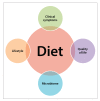Diet and Inflammatory Bowel Disease
Abstract
Patients with inflammatory bowel disease (IBD) are increasingly becoming interested in nonpharmacologic approaches to managing their disease. One of the most frequently asked questions of IBD patients is what they should eat. The role of diet has become very important in the prevention and treatment of IBD. Although there is a general lack of rigorous scientific evidence that demonstrates which diet is best for certain patients, several diets-such as the low-fermentable oligosaccharide, disaccharide, monosaccharide, and polyol diet; the specific carbohydrate diet; the anti-inflammatory diet; and the Paleolithic diet-have become popular. This article discusses the diets commonly recommended to IBD patients and reviews the supporting data.
Keywords: Low-FODMAP diet; Paleolithic diet; anti-inflammatory diet; high-fat diet; inflammatory bowel disease; low-fat diet; specific carbohydrate diet.
Figures
References
-
- Appleyard CB, Hernández G, Rios-Bedoya CF. Basic epidemiology of inflammatory bowel disease in Puerto Rico. Inflamm Bowel Dis. 2004;10(2):106–111. - PubMed
-
- Yang SK, Yun S, Kim JH, et al. Epidemiology of inflammatory bowel disease in the Songpa-Kangdong district, Seoul, Korea, 1986-2005: a KASID study. Inflamm Bowel Dis. 2008;14(4):542–549. - PubMed
-
- Hou JK, Abraham B, El-Serag H. Dietary intake and risk of developing inflammatory bowel disease: a systematic review of the literature. Am J Gastroenterol. 2011;106(4):563–573. - PubMed
-
- Amre DK, D’Souza S, Morgan K, et al. Imbalances in dietary consumption of fatty acids, vegetables, and fruits are associated with risk for Crohn’s disease in children. Am J Gastroenterol. 2007;102(9):2016–2025. - PubMed
Grants and funding
LinkOut - more resources
Full Text Sources
Other Literature Sources
Medical


